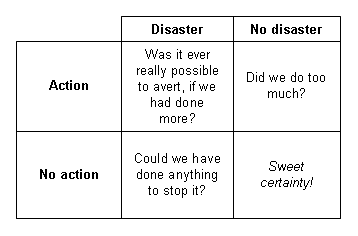I have written before about the problem of what can and cannot be known about climate change, given that we only have one planet to experiment on, and our simulations will never be accurate beyond question. Here is another expression of the same basic idea. I am trying to figure out the most effective way to convey this information to people who don’t think we should be taking aggressive action on climate change.
This chart shows four possible situations that humanity could find itself in, 100 years or so from now. Either climate change has been disastrous or it has not been, and we either took strong action to deal with it or we did not:
As you can see, there is only one situation in which we can be absolutely sure we made the right choice. Even that is a bit ambiguous, though. Imagine the decision isn’t about climate change but about Russian Roulette. If we are alive after the game, but we did choose to play, can we really be said to have behaved prudently? The sheer fact that the chamber didn’t turn out to be loaded doesn’t mean that we were intelligent to run the risk, back when we didn’t know that for sure.
Imagine two snakes, both of which look very similar. One is deadly venemous, and the other is benign. If the best information we have at hand suggests that there is a good chance we are dealing with the venemous one (say, because we are in the region where it usually lives), the prudent thing is certainly to behave as though the snake may be venemous. Even if you learn later that it was not, nobody will think you were a fool for acting that way. The climate science we have now is providing good reasons to think that we are dealing with a deadly snake of a problem.
In short, the science will never be settled in the sense that it will tell us exactly what to do. All it can do is become clear enough to make the prudent choice obvious to most people.


Isn’t this decision matrix a lot like Pascal’s Wager about believing in the existence in God?
Both involve making choices in the face of uncertainty, yes. And they involve acting to avoid the worst possible outcome.
As an aside, one big problem for Pascal is choosing the wrong god. A lot of them are awfully insistent that you worship them specifically, and not some other god. As such, you might annoy a hypothetical deity more by taking up the wrong faith than you would be abstaining from religion altogether.
Once you have accepted that climate change is seriously dangerous for humanity, I don’t think you need much more fancy game theory to tell you what to do.
That said, reasoning processes like the one above may be useful for convincing people who are a bit concerned about climate change, but not yet truly confident that it is a major problem.
Absolutely, we all know that Odin is the one true diety to worship, lest I be struck down by a thunderbolt from Thor (on Odin’s orders of course)…
I only pointed it out because the underlying premise with any decision matrix (and that of game theory), is that the actors are fundamentally rational, and if anything human history has taught us, is that we are not the perfectly rational actors that strict economists would like and base their models on.
Concerning climate change, the ill effects, as assured as they are, will not affect people living now until perhaps the ends of their lives, but the immediate reduction of their consumption will adversely affect their lives with little (if any) short term gain. Little wonder that it is hard to get people to reduce their consumption. People with children might be more able to be convinced but with fewer and fewer people in the 1st world having children (the ones doing most of the consumption), there is less rational self-interest to reduce their immediate impact on the environment for the future generations (which won’t belong to their offspring).
The problem (and perhaps irony) is that the people whose lives will be affected will only come into power to do something about it until it is likely too late to stop.